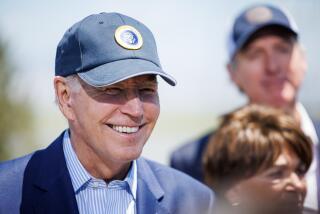Perot: Instant Medium for the Angry Message : But Texan has to get out of TV studio and mix it up more
For now the momentum in this year’s presidential campaign seems to be running strongly with Ross Perot, the Texas billionaire who is expected to formally announce his candidacy next month. What is it that accounts for the powerful appeal of this man about whom the public as yet knows so little but with whom it seems so taken?
A Los Angeles Times Poll of California voters provides a sharp if not surprising insight. Asked to give the main reasons why they back Perot, 27% of those who prefer him over George Bush or Bill Clinton said he “represents change”; 19% said it’s because “he’s an outsider”; 16% said it’s because he’s “not tied to a party.”
The interesting thing about those responses is that they really don’t have much to do with Perot, with his character, his experience, his temperament, with what he may stand for or hope to achieve. What they reveal instead is a statistically significant and angry expression of no confidence, even--it is by no means too strong a word--of disgust with what traditional politics has become in this country, and with the way presidential campaigns are run.
What the public is saying, through the vehicle of the emerging Perot candidacy, is pretty much what the polls show it has been thinking for quite some time: It is fed up with being manipulated, lied to and taken for granted by the major parties and their leaders, it is weary of government it sees as corrupt, increasingly ineffective and unresponsive. These are wholly understandable grievances. American politics, never lofty, seem in the age of television, of well-heeled political action committees, of special interest influences to have become steadily more narrowly focused and mendacious. The clear message being delivered by the polls is that someone--anyone--who seems to offer a plausible alternative can count on a lot of support.
Is Ross Perot such an alternative?
The answer for now is, of course, that it’s too soon to tell. Perot is a very rich man who knows how to work the system to help himself and otherwise get things done, a man who’s used to giving orders and having them followed. These are not necessarily disabilities when it comes to being President. Neither are they necessarily virtues.
What Americans don’t know about Perot is what he would do to bring the deficit under control, boost the economy and reform government. They don’t know where he stands on taxes or urban policy, or what global role he sees for the United States. Perot advertises himself as a can-do achiever; trust me, he says, and I’ll get things done. But getting things done doesn’t mean just giving orders. It means working with Congress, making compromises, cutting deals. Would Perot be capable of that?
As the campaign proceeds, more should be revealed--assuming that Perot makes himself available so that his views can be rigorously explored, instead of just taking refuge in a TV studio and responding to filtered questions from the public. Yes, there’s a lot wrong with what American politics and government have become. But there are no miracle cures in sight, and an electorate that succumbs to the hope that there are will only find itself badly fooled.
More to Read
Get the L.A. Times Politics newsletter
Deeply reported insights into legislation, politics and policy from Sacramento, Washington and beyond. In your inbox three times per week.
You may occasionally receive promotional content from the Los Angeles Times.






